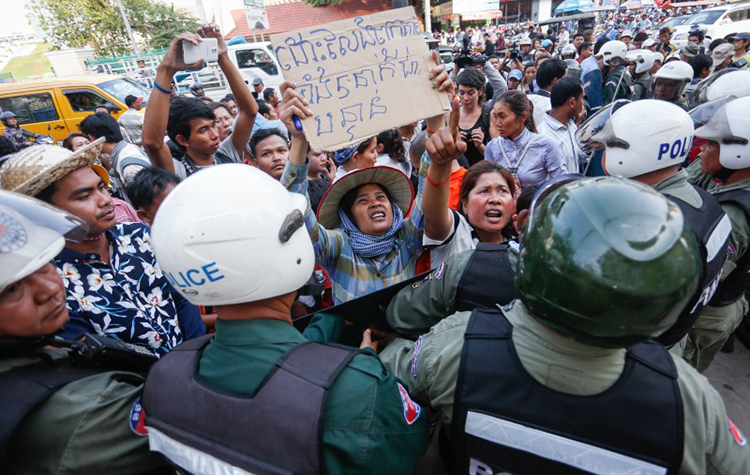 (Geneva, 4 July 2016) – The 32nd session of the UN Human Rights Council which concluded its debates on Friday, 1 July 2016, saw several states speak out against the narrowing space for civil society and dissent in Cambodia. On Thursday, Japan, France, United States, the United Kingdom and the European Union expressed concern at the recent escalation of attacks on civil society and the political opposition.
(Geneva, 4 July 2016) – The 32nd session of the UN Human Rights Council which concluded its debates on Friday, 1 July 2016, saw several states speak out against the narrowing space for civil society and dissent in Cambodia. On Thursday, Japan, France, United States, the United Kingdom and the European Union expressed concern at the recent escalation of attacks on civil society and the political opposition.
This cross-regional condemnation of Cambodia at the 32nd session of the Human Rights Council follows the detention of senior staff of the Cambodian Human Rights and Development Association (ADHOC) and members of the opposition. Four staff of ADHOC – a prominent human rights organisation in Cambodia – and an official of the National Election Committee (NEC), who was also a former staff of ADHOC, have been detained since late April on trumped up allegations of bribing a witness after responding to a request for legal assistance.1
In his opening statement to the Council on 13 June, the UN High Commissioner for Human Rights said the recent arrests of opposition and civil society members indicate a “drastic and deplorable narrowing of the democratic space” that is not conducive to credible elections in 2017 and 2018.
Speaking at the Council on Thursday, Japan, the main sponsor of the Human Rights Council resolution on the situation of human rights in Cambodia, expressed concern at “the current escalation of political tensions in Cambodia, which have resulted in considerable narrowing of space for legitimate and normal activities by opposition parties and civil society organisations.” The European Union, speaking for its 28 member states, echoed calls by Japan and the UN High Commissioner for Human Rights “to ensure a safe and enabling environment for human rights defenders and civil society.”
During the 32nd session of the Council, Belgium and Switzerland also voiced their concern over the restrictive legal framework for freedom of expression, assembly, and association in Cambodia. Freedom of assembly and association in Cambodia has been steadily deteriorating for the past few years. In August 2015, Cambodia adopted the Law on Associations and Non-Governmental Organisations (LANGO). The law, which has been criticised by several UN special procedures, imposes severe restrictions on civil society and adds a chilling effect to the already oppressive environment for freedom of association in the country.
At the Council the Cambodian government failed to respond to the international community’s concerns in a constructive manner. Instead it responded with denials, accused the Council of politicisation, double-standards, and selectivity and accused states of infringing on Cambodia’s judicial procedures and interfering in its internal affairs.
Statements at the Human Rights Council show that the world is not going to turn a blind eye as the Cambodian government blatantly abuses its legal system and judiciary to silence independent voices and civil society.
The international community has put the Cambodian government on notice ahead of the Council’s substantive discussions on the human rights situation in the country in September. The government will face harsher international scrutiny if it fails to address serious human rights concerns in the country by 33rd session of the Human Rights Council in September. It should start by immediately releasing detained civil society and opposition members.
Signed by:
Asian Forum for Human Rights and Development (FORUM-ASIA)
Cambodian Center for Human Rights
Cambodian League for the Promotion and Defense of Human Rights (LICADHO)
Civil Rights Defenders
International Commission of Jurists (ICJ)
International Federation for Human Rights (FIDH)
World Organisation Against Torture (OMCT)
1 – https://forum-asia.org/?p=20669




